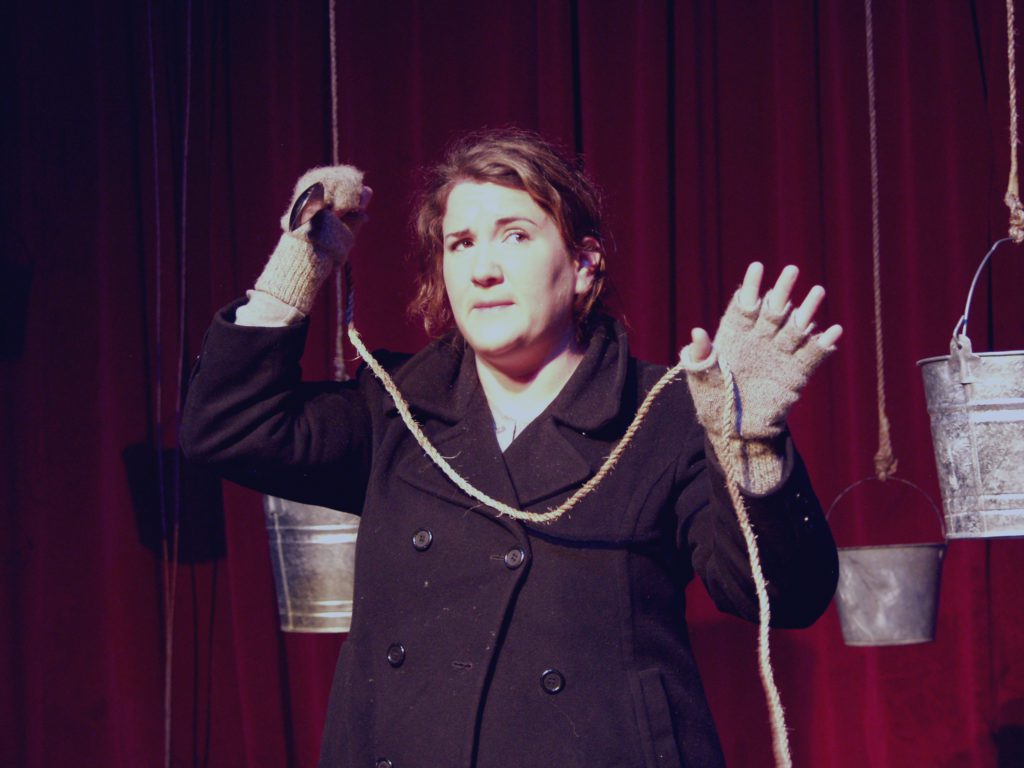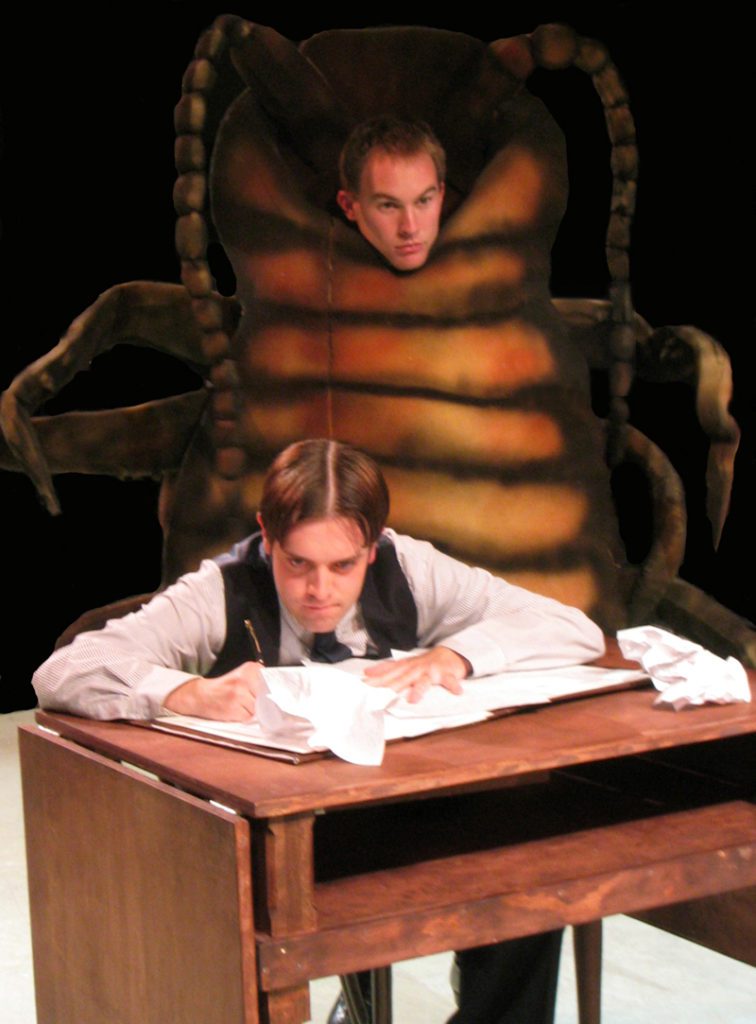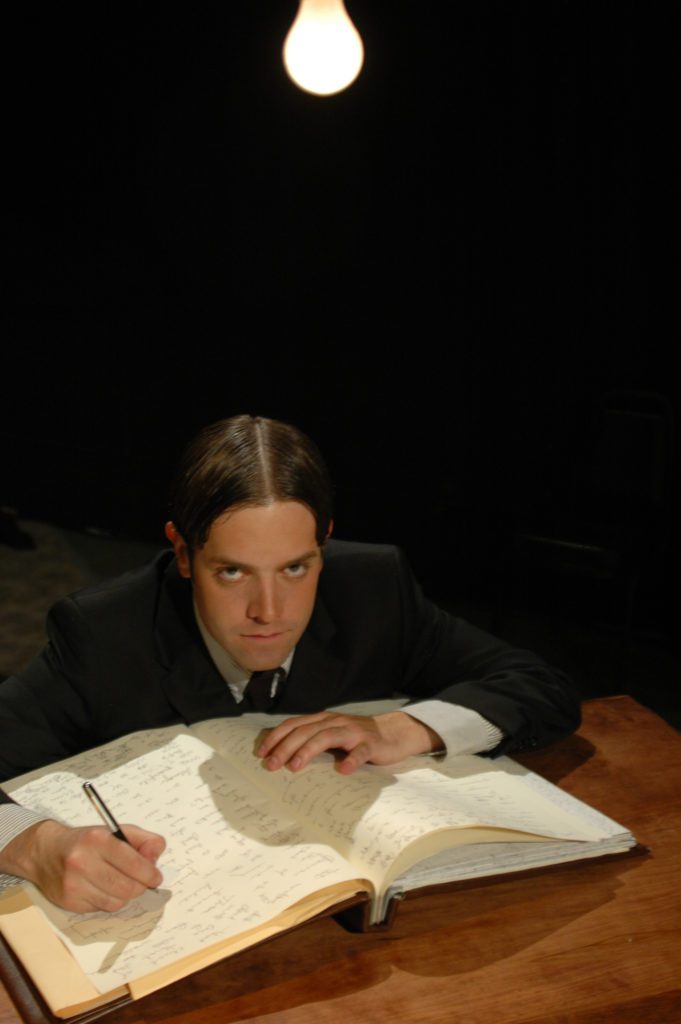The parking lot is full, and cars line the curb on both sides of the street. Inside, people throng the lobby. A couple is being turned away at the front desk: “I’m sorry. We’re all sold out.” When I first visited this place a few years ago, there were seven or eight people in attendance, including myself and my friend. Now word must be out that this is the place to be on Saturday night: Buntport Theater, the opening of Kafka on Ice.
We find seats and settle in to clip-cloppy, ’30s-style music that sounds like the Charleston. We’re going to be close enough to the action to see the sweat shine on the actors’ faces. There are rows of chairs on all four sides of a green square of artificial ice – not gleaming ice-rink stuff, but something that looks like ancient linoleum, scratched and scuffed.
What on earth do these people at Buntport think they’re doing? Franz Kafka is a melancholy figure, a Prague-dwelling German Czech, steeped in the history of his time, the creator of a dwindling, despairing art. Not noisily or grandly despairing, but art that’s a kind of falling away, a hopeless whispering, the toneless song of Josephine the Mouse Singer, the silent melting of flesh from bone in The Hunger Artist, an art of terror, self-loathing and wordless longing for what can never be attained – and all of it limned in that precise bureaucrat’s prose. Kafka’s best-known works include a novel about a man tried for an act he doesn’t even know has been committed – let alone by him – and ultimately executed. Another describes a castle from which it’s impossible to escape. And then there’s the long short story called The Metamorphosis, which almost every high school student knows and which begins, “As Gregor Samsa awoke one morning from uneasy dreams he found himself transformed in his bed into a gigantic insect.”
But all of these cheerful Saturday-night people haven’t come here to explore the sorrows of old Europe. They’ve come for a good time. And the Buntporters aren’t exactly known for their worshipful treatment of the classics. But then, they’re not known for denigrating or nullifying or being plain dumb about literature, either. So what are we going to see?
The bouncy music stops. In the darkness that follows, we hear the scritching of a pen on paper, like the sounds of a skate blade on ice. Under the sudden illumination of a single, bare lightbulb, we see Kafka, played by Gary Culig, writing at a desk. Within minutes, the rest of the cast has skated on in impressive unison – yes, wearing real skates – and the show takes off.
Kafka on Ice is part biography. It tells Kafka’s story, about his fear of his overbearing father, his unhappy love life, his friendship with Max Brod, the way in which Gregor Samsa’s predicament represents his own. But it also deals with the way a work like The Metamorphosis changes over time, as it passes through the minds of friends, readers, critics, fellow writers, teachers and tricksters like the Buntport gang. So at one point you have the great novelist Vladimir Nabokov (played by Erik Edborg) arguing that, contrary to some critical opinion, the insect in The Metamorphosis is clearly a beetle, not a cockroach. Then there’s a teacher (a hilarious performance by Erin Rollman) trying to communicate the idea of symbolism to her bored class while peeping periodically at her own cheat notes. The lights go out, and a voice reads a passage aloud in the darkness, bringing clarity and focus to the words. When the lights return, we watch a schoolboy cross the stage with his satchel on his back, reading as he walks.
The Metamorphosis goes through several transmutations: It’s played as farce, as an experiment with objects, as grinning, dancing musical comedy.
Buntport has its own way of dealing with Kafka’s life story. The writer’s meeting with his first love, Felice, is shown as a scene in a silent movie. She falls cutely about on the ice, while he, Chaplin-like, attempts to rescue her – all to the accompaniment of a plinking piano.
This show is anything but Kafkaesque. It’s lighthearted, giddy and goofy. As written, the climax of The Metamorphosis begins with a heartbreaking scene in which Gregor is drawn from his seclusion by the haunting sound of his sister playing the violin. In Kafka on Ice – which has earlier referred to Kafka’s thoughts on his own Jewishness – he hears the violin solo from Fiddler on the Roof.
Buntport creates an Alice in Wonderland world where objects take on their own life and shrink and grow at will. The city of Prague is represented by a pop-up in a book. Gregor Samsa is at one point a glove puppet, seconds later a remote-controlled mechanical toy, and finally, a costumed actor.
There are some really beautiful moments. Kafka sends Felice one of his stories to read; in her hands, it unfurls into the paper figure of a man, and she dances with it. “The writing does quite well with her,” observes Kafka. When Kafka proposes to another love, Milena, his words are made of light, flowing over the rows of audience members, across the ersatz ice and away up the walls. Her response is a calligraphic “Yes.”
I have a couple of quibbles. Every now and then, the script is repetitive. Culig is a good actor, but he has an endearing, vulnerable quality that doesn’t feel quite right for Kafka. Brian Colonna’s Max Brod is pinch-faced, squeaky-voiced and very amusing, but too much of a caricature – both as performed and as conceived. The real Max Brod was far more than a leech who took advantage of Kafka’s fame; he was also the author’s longtime friend and loyal advocate. But all six actors do well. Erik Edborg has to stifle his insanely anarchic instincts to play Kafka’s heavy-handed father, and it works. Evan Weissman’s turn as the charlady (in a uniform that’s pure French maid) is a hoot, as is Hannah Duggan’s determined yet perplexed expression every time she skates across the stage with a flour sack in her mouth (don’t ask). As for Erin Rollman, I don’t have words to describe her performance. She’s a brilliant comic universe unto herself.
All of which explains the crowd in the lobby. It’s safe to say that no one else – anywhere – is doing theater like this.
-Juliet Wittman, October 14, 2004, Westword



